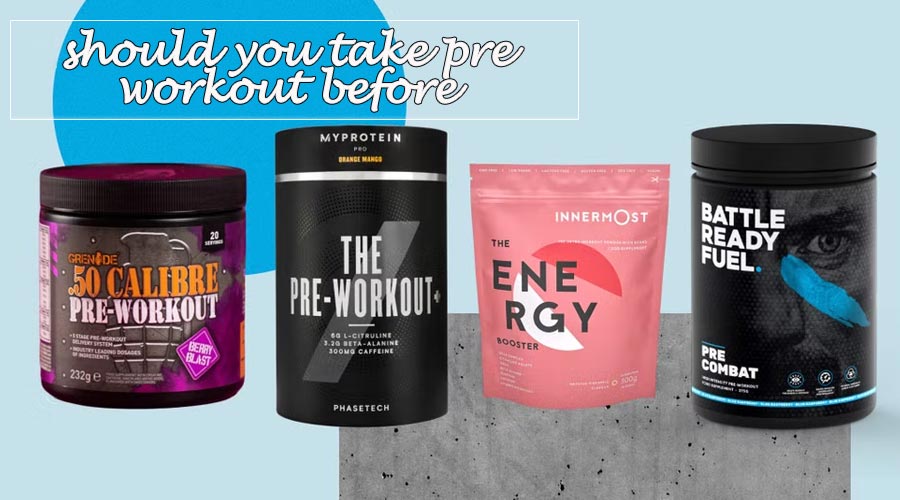
Pre-workouts are becoming increasingly popular for people who are looking to intensify their workouts. Whether you are a recreational runner or a competitive athlete, pre-workouts can help give you the extra edge that you’re looking for. By supplementing your running routine with pre-workout, you can increase your endurance and improve your overall performance.
When it comes to pre-workout supplementation, there is no one-size-fits-all approach. It is important to do research on different types of supplements to ensure that they meet your specific health goals and needs. Generally speaking, pre-workout supplements should provide an energy boost with ingredients such as caffeine and creatine monohydrate while also helping to reduce inflammation and muscle soreness with ingredients like beta-alanine and citrulline malate.
What is Pre Workout?

Pre Workout is a type of dietary supplement used to increase energy and performance during physical activity. It contains ingredients, such as caffeine, B vitamins, amino acids, and other herbal extracts. Pre-workout has become increasingly popular among athletes and gym goers alike who are looking for an extra boost before they hit the weights or take on a particularly demanding workout routine.
The use of pre-workout allows people to push through fatigue which can occur either due to lack of sleep or overtraining. Caffeine acts as an ergogenic aid by stimulating the central nervous system and providing an immediate boost in energy levels. This can help you maintain focus during long periods of training or provide enough drive to power through that last rep when you’re feeling exhausted. It also decreases fatigue during workouts by blocking adenosine receptors, which are the neurotransmitters responsible for making you feel tired.
Pre-Workout and Running
Pre-workout supplements and running are a great combination for athletes looking to maximize their performance. Taking pre-workout supplements before working out has become increasingly popular, due to the increased energy and focus it can provide. For those who want to make the most of their running performance, taking pre-workout is an excellent option. The pre-workout can help provide an extra boost of energy while also helping to improve focus and alertness during long runs. Additionally, it can help reduce fatigue and muscle soreness after a long run by providing essential nutrients that may be lost during exercise.
When choosing what type of pre-workout supplement to take, it’s important to consider your own needs and preferences. Different brands have different ingredients which offer varying levels of stimulation so you should pick one that suits your specific needs and goals best.
Read more about Sustanon 250 Bodybuilding
Benefits of Running
Running is a great way to stay healthy and fit. It offers a wide variety of benefits, both physical and mental, that cannot be achieved with other forms of exercise. From its effectiveness in weight control to its ability to reduce stress and anxiety, running can provide enormous health benefits for anyone who chooses to take it up as part of their lifestyle.
The foremost benefit of running is its effectiveness in aiding weight loss. When done consistently at an appropriate intensity, running can help you achieve your weight-loss goals faster than with any other form of exercise. Additionally, taking regular runs will help improve your cardiovascular fitness over time – strengthening your heart and lungs so that you have better endurance when engaging in everyday activities or sports pursuits.
What is a Pre-Workout Supplements?
Pre-workout supplements are becoming an increasingly popular choice for athletes and gymgoers alike. Taking the right pre-workout can make a huge difference in performance and ultimately, results. Pre-workouts consist of various ingredients such as amino acids, vitamins, herbs, minerals, and stimulants that work together to give you an energy boost while improving focus and alertness.
The benefits of pre-workouts are vast but some key ones include improved physical performance in terms of endurance, strength gains, improved muscular power output, and increased fat-burning capacity. Additionally, mental focus during workouts is increased due to the effects of certain stimulants found in many pre-workouts. It is important to check the ingredient list before consuming any pre-workout supplement to ensure it meets your dietary requirements or goals.
Types of Pre-Workout Supplements

Pre-workout supplements are becoming increasingly popular within the fitness industry. It is important to understand the different types of pre-workout supplements available so that users can make an informed decision about which product will best suit their needs. Creatine is one of the most common types of pre-workout supplements and works by helping to increase energy levels, allowing individuals to work out for longer periods of time with more intensity. Another type of pre-workout supplement is caffeine, which helps to stimulate the body before a workout; caffeine also increases mental alertness and can help those who suffer from fatigue during a workout. Beta-alanine is another ingredient used in pre-workout supplements; it helps reduce muscle fatigue, allowing people to perform at higher levels for longer durations.
Benefits of Taking Pre-Workout Before Running
One of the key benefits of taking pre-workout before running is improved energy. This can be especially beneficial if you’re an early-morning runner and need that extra boost of energy to get you going. Pre-workout supplements, such as caffeine and creatine, have been proven to increase the amount of time athletes are able to stay active and energetic during endurance events. In addition, pre-workouts can also improve focus by increasing alertness and enabling runners to zone in on their technique while running. Taking pre-workouts before a run can help runners push themselves further mentally and physically, leading to greater progress overall.
Another benefit of taking pre-workouts prior to running is improved performance as it helps reduce perceived exertion levels. This is because pre-workouts can help reduce perceived effort by increasing the level of lactate threshold. This means that runners will be able to maintain a consistent pace without tiring out as quickly. Pre-workouts can also help improve recovery after a run. They can reduce recovery time and help runners get back on track for the next run.
Potential Risks of Pre-Workout Before Running
Pre-workout is a popular supplement to help athletes maximize their potential during activity, but there are potential risks associated with taking pre-workout before running. Pre-workout generally contains stimulant ingredients such as caffeine and beta-alanine, which increase the heart rate and can interfere with the body’s natural processes. The rush of energy these supplements provide can also be addicting, and long-term use can lead to detrimental side effects like anxiety, hypertension, insomnia, poor concentration, and stomach pain. Before taking a pre-workout before running it is essential to understand how your body will react to these ingredients in order for you to make an educated decision about if it’s right for you or not.
Read more about Anadrol Cycle
Tips for Taking Pre-Workout
If you’re looking to maximize your performance when running, taking pre-workout supplements can be a great way to help. Pre-workout supplements contain ingredients such as caffeine and amino acids that provide extra energy and focus before you start your run. Here are a few tips for taking pre-workout before running:
First, be aware of how the product works and its possible side effects. Some people may experience jitters or even nausea after consuming certain pre-workouts so it is important to read the label carefully. It’s also important to take the recommended dosage; too much can be counterproductive and even dangerous!
Second, make sure you consume enough water throughout the day leading up to your run as well as during your run. Pre-workouts often contain stimulants which can cause dehydration if not properly managed with water intake.
Third, if you’re taking a pre-workout drink before a run, it s important to make sure you don t take it on an empty stomach. Eating some food before the workout will help your body digest the supplements more efficiently and less likely to experience adverse side effects. And lastly, if you’re trying a new pre-workout drink, start with half the recommended dosage and increase it gradually until you reach your desired level of intensity.
Timing of Pre-Workout Consumption

Timing of pre-workout consumption before running is incredibly important for a successful and safe workout. Knowing when to consume your pre-workout shake or snack can make all the difference in performance and energy levels during physical activity. Generally, runners should have their pre-workout meal thirty minutes to an hour prior to starting the session. This provides the body with enough time to digest and absorb the necessary nutrients, allowing the athlete to begin their run feeling energized and strong.
The type of food consumed also plays an important role in the timing of pre-workout meals. For a long-distance run, it’s best to choose foods that contain complex carbohydrates such as oatmeal or whole-grain bread as these provide sustained energy throughout exercise rather than the quick bursts of energy that simple carbohydrates offer.
When to Avoid Taking Pre-Workout
Pre-workout supplements can provide a great boost to your physical activity, giving you the extra energy and focus required to reach your goals. However, there are certain times when taking pre-workout is not recommended.
First off, if you’re already tired or exhausted due to lack of sleep or another form of stress, take a break and rest instead. Pre-workout contains stimulants that increase heart rate and blood pressure which can be dangerous in these situations. Additionally, it should not be taken on an empty stomach as it can lead to dehydration and weakened muscles. If you’re going to use pre-workout, make sure you’ve had at least a snack before exercising so that your body has the energy it needs.
Read more about Nandrolone Phenylpropionate
How to Choose the Right Pre-Workout?
Choosing the right pre-workout supplement can be a difficult task. There are so many different options on the market and it can be hard to determine which is best for your individual needs. It’s important to take into consideration key factors such as ingredients, dosage, safety, and price in order to make an informed decision.
When considering ingredients, look for pre-workouts with natural elements that are proven effective boosters like caffeine and BCAAs. Don’t just buy something because it has flashy labels claiming it will do amazing things—check the label and research reviews so you know what’s in it! Dosage should also be taken into account; too much of any ingredient has potential side effects or could interact negatively with existing medications or supplements you’re taking.
Nutrition Strategies for Runners

Nutrition is essential for runners to reach their performance goals, as fuel sources must be available to power the body during long runs. Optimizing nutrition strategies can help a runner to meet their objectives and avoid fatigue, dehydration, and injury. The following nutrition strategies can help runners get the most out of their performance:
Consumption of carbohydrates before a workout provides an energy boost for the body. Eating complex carbs such as whole-grain toast or oatmeal is beneficial for providing sustained energy over long distances. Additionally, eating protein within 30 minutes after completing a run helps with muscle recovery and prevents soreness in the days afterward. Protein sources like eggs, dairy products, or tofu are good options for replenishing depleted stores of amino acids after training sessions.
Conclusion: Choose Wisely Your Pre Workout Before Running
When it comes to preparing for a run, choosing the right pre-workout is an important part of setting yourself up for success. A good pre-workout supplement can help provide you with the energy, focus, and endurance needed to get through your run feeling strong and energized. As with any supplement, however, it is important to choose wisely.
Before making a decision on which pre-workout is right for you, consider what kind of run you will be doing and how intense it will be. If you are planning a long-distance run or an intense speed session, then look for supplements that provide sustained energy throughout the whole workout. This could include caffeine-based products that contain B vitamins and electrolytes to help support hydration levels during your training session.